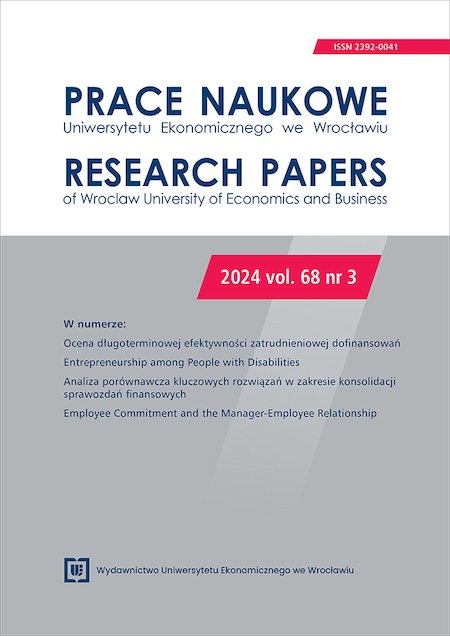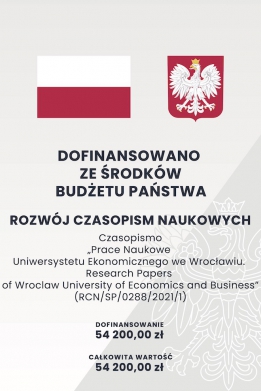Przedsiębiorczość osób z niepełnosprawnością w warunkach niestabilnego makrootoczenia
Słowa kluczowe:
przedsiębiorczość, samozatrudnienie, makrootoczenie, osoby z niepełnosprawnościąAbstrakt
Cel: W opracowaniu podjęto próbę poznania, charakterystyki i identyfikacji zachowania się osób z niepełnosprawnością jako przedsiębiorców działających w formie samozatrudnienia w okresie dynamicznych zmian w makrootoczeniu związanych z wybuchem pandemii COVID-19 oraz wojny w Ukrainie.
Metodyka: W opracowaniu podjęto próbę identyfikacji czynników wpływających na zmiany w samozatrudnieniu osób z niepełnosprawnością i osadzenia ich w kontekście zmian zachodzących w makrootoczeniu. W szczególności przedmiotem badań stało się ustalenie trendów w samozatrudnieniu osób z niepełnosprawnością na tle ogółu społeczeństwa w wieku 15 lat i więcej wykazywanego w badaniach aktywności ekonomicznej ludności w kontekście wybranych parametrów makroekonomicznych. Na potrzeby opracowania sformułowano następującą hipotezę badawczą: Przedsiębiorczość osób z niepełnosprawnością jest dobrą alternatywą dla pracy na etacie w warunkach niestabilnego makrootoczenia, gdyż pozwala tym osobom na większą samodzielność decyzyjną i finansową, elastyczność czasu pracy oraz lepsze wykorzystanie swoich indywidualnych cech psychofizycznych niż w przypadku pracy na etacie. Badaniami objęto osoby z niepełnosprawnością samozatrudnione i wykazywane w rejestrach Państwowego Funduszu Rehabilitacji Osób Niepełnosprawnych (PFRON). Przyjęte metody badawcze to: analiza krytyczna piśmiennictwa, analiza statystyczna, metoda indukcyjna oraz analiza zależności oparta na współczynniku korelacji Pearsona.
Wyniki: W świetle przeprowadzonych studiów literaturowych i badań empirycznych nie udało się autorom w pełni potwierdzić sformułowanej hipotezy. Przedmiotowa hipoteza badawcza została zweryfikowana jedynie w stosunku do części samozatrudnionych osób z niepełnosprawnością w stopniu znacznym i umiarkowanym. W relacji jednak do ogółu samozatrudnionych osób z niepełnosprawnością należy ją odrzucić. Podstawowy zakres czasowy badań ustalono na lata 2019-2022 i pierwszy kwartał 2023 r.
Implikacje i rekomendacje: Autorzy wskazują na konieczność kontynuacji procesu badawczego w zakresie zachowania się przedsiębiorców z niepełnosprawnością w warunkach niestabilnego makrootoczenia. Niniejsze opracowanie stanowi pretekst do dalszej dyskusji i rozważań w tym zakresie i uzasadnia konieczność weryfikacji przyjętych założeń badawczych w przyszłości wraz z upływem kolejnych lat i pozyskiwaniem nowych danych. Pozwoli to na uniknięcie typowych błędów wynikających z relatywnie krótkiego zakresu czasowego obserwacji.
Oryginalność/wartość: Artykuł jest odpowiedzią na potrzeby poznawcze w zakresie funkcjonowania przedsiębiorców z niepełnosprawnością w warunkach gwałtownych zmian makroekonomicznych. W literaturze obserwuje się wyraźny niedosyt w tym zakresie. Niniejsze opracowanie ma również za zadanie wypełnić istniejącą lukę w badaniach naukowych dotyczących sytuacji osób z niepełnosprawnością w Polsce i na świecie.
Pobrania
Bibliografia
Alexander, E. et al. (2020). Severe Acute Respiratory Syndrome-related Coronavirus. The Species and its viruses – a Statement of the Coronavirus Study Group. Biorxiv.
Arnold, N. L., and Seekins, A. (2002). Self-employment: A Process for Use by Vocational Rehabilitation Agencies. Journal of Vocational Rehabilitation, (17), 107-113.
Asahi, K., Undurraga, E. A., Valdés, R., and Wagner, R. (2021). The Effect of COVID-19 on the Economy: Evidence from an Early Adopter of Localized Lockdowns. J Glob Health, 11(05002).
Barrett, R. (2010). Disadvantaged Groups in the Labour Market. Economic & Labour Market Review, (4), 18-24.
Bigg, M. M. (2023). Six Ways the War Changed the World. The New York Times, Feb. 24, 2023. Retrieved February 27, 2023 from https://www.nytimes.com/2023/02/24/world/europe/ukraine-war-global-impact.html
Bloomberg. (2023, June 23). Not Everything Is Getting Back to Normal in the Post-Pandemic Economy. Bloomberg.com
Cheng, W., Carlin, P. Carroll, J., Gupta, S., Rojas, R. F., Montenovo, L., Nguyen, T. D., Schmutte, I. M., Scrivner, O., Simon, K. I., COVID-19 Reopenings. National Bureau Of Economic Research 1050 Massachusetts Avenue Cambridge, (Ma 02138). https://www.nber.org/system/files/working_papers/w27419/w27419.pdf Wing, C., and Weinberg, B. (2020, June). Back to Business and (re)Employing Workers? Labor Market Activity during State
Chohan, U. W. (2022, January). The Return of Keynesianism? Exploring Path Dependency and Ideational Change in Post-covid Fiscal Policy. Policy & Society, 41(1), 68-82.
Damelang, A., Ebensperger, S., and Stumpf, F. (2021). Immigrant’s Labour Market Disadvantages Across Western Europe: The Role of Composition and Context. Journal of International Migration and Integration, (22), 1525-1550. Retrieved October 20, 2023 from https://link.springer.com/article/10.1007/s12134-021-00823-3
Danieli A., and Wheeler, P. (2006). Employment Policy and Disabled People: Old Wine in New Glasses? Disability & Society. Taylor & Francis.
Dębkowska, K., Kłosiewicz-Górecka, U., Szymańska, A., Wejt-Knyżewska, A., and Zybertowicz, K. (2023). Wpływ wojny w Ukrainie na działalność polskich firm. Polski Instytut Ekonomiczny.
Doyle, A. (2002). A Realistic Perspective of Risk in Self-Employment for People with Disabilities. Journal of Vocational Rehabilitation, (17), 115-24.
Eigner, P., and Umlauft, T. S. (2015, July 1). The Great Depression(s) of 1929–1933 and 2007–2009? Parallels, Differences and Policy Lessons. Hungarian Academy of Science. SSRN 2612243.
Elsevier. (2023, November 4). Maximum Likelihood Estimation of the Correlation Coefficient in a Bivariate Normal Model with Missing Data – ScienceDirect.
Emmenegger, P., Marx, P., and Schraff, D. (2015, April). Labour Market Disadvantage, Political Orientations and Voting: How Adverse Labour Market Experiences Translate into Electoral Behaviour. Socio-Economic Review, 13(2), 189-213.
Eurostat. (n.d.) LFS Main Indicators (lfsi). https://ec.europa.eu/eurostat/cache/metadata/en/lfsi_esms.htm
Fairlie, R. (2020, May). The Impact of COVID-19 on Small Business Owners: Evidence of Early-Stage Losses from the April 2020 Current Population Survey (Discussion Paper Series). IZA – Institute of Labor Economics. http://ftp.iza.org/dp13311.pdf
Garren, S. T. (1998, June 15). Maximum Likelihood Estimation of the Correlation Coefficient in a Bivariate Normal Model, with Missing Data. Statistics & Probability Letters, 38(3), 281-288.
Glikman, P., Kabaj, M., and Muszkie, T. (1997). Ciągłość i transformacja gospodarki. Wydawnictwo Key Text.
GLOBSEC. (2022). Policy Institute Team. Economic Recovery in Central Economic Recovery in Central and Eastern Europe (CEE): Towards a New Normal. Research Report. Policy Institute & Vienna Insurance Group (VIG).
Główny Urząd Statystyczny. [GUS]. (2023). Wskaźniki cen towarów i usług konsumpcyjnych (pot. inflacja). https://stat.gov.pl/obszary-tematyczne/ceny-handel/wskazniki-cen/wskazniki-cen-towarow-i-uslug-konsumpcyjnychpot-inflacja-/
Gołacka, M., and Keczeń, J. (1997). Zmiany na rynku pracy. Gospodarka Polski w procesie transformacji. IRiSS.
Gorbalenya, A., E., Baker, S. C., Ralph, S., Baric, R. S., de Groot, R. J., Drosten, C., Gulyaeva, A. A., Haagmans, B. L., Lauber, C., and Leontovich, A. M. (2020). Severe Acute Respiratory Syndrome-Related Coronavirus. The Species and Its Viruses – a Statement of the Coronavirus Study Group. biorxiv
Hałka, A., and Leszczyńska, A. (2011). Wady i zalety wskaźnika cen towarów i usług konsumpcyjnych – szacunki obciążenia dla Polski. Gospodarka Narodowa, (9).
Harris, S. a.o. (2022, August 16). Road to War: US Struggled to Convince Allies, and Zelenskyy, of Risk of Invasion. The Washington Post.
Kaliński, J., and Landau, Z. (2003). Gospodarka Polski w XX wieku (ed. 2, pp. 369-404). Polskie Wydawnictwo Ekonomiczne.
Kidd, M. P., Sloane, P. J., and Ferko, I. (2000). Disability and the Labour Market; An Analysis of British Males. Journal of Health Economics, (19).
Koza, A., and Politaj, A. (2020). Basic Barriers to the Self-employment of Disabled People in Poland and in Other Countries – Results of Surveys. In D. Kopycińska, T. Bernat (Eds.), Ekonomiczne wyzwania współczesnego świata (pp. 109-117). Wydawnictwo SIZ.
Koza, A., and Politaj, A. (2021). The Situation of Persons with Disabilities on The Labour Market in Poland And Other Countries Association Conference (IBIMA), pp. 4004-4012). International Business Information Management Association (IBIMA). During The COVID-19 Pandemic. In S. Soliman Khalid (Ed.), Innovation Management and Information Technology Impact on Global Economy in the Era of Pandemic (Proceedings of the 37th International Business Information Management Langley, P. (2015). Liquidity Lost: The Governance of the Global Financial Crisis (pp. 83-86). Oxford University Press.
Office for Foreigners. (2023). https://www.gov.pl/web/udsc/obywatele-ukrainy-w-polsce--aktualne-dane-migracyjne2#:~:text=Obecnie%20zarejestrowanych%20na%20tej%20podstawie%20jest%20prawie%201,obywateli%20Ukrainy%20posiada%20wa%C5%BCne%20zezwolenia%20na%20pobyt%20czasowy
Office of Disability Employment Policy (ODEP). (n.d.). Employment for Persons with a Disability: Analysis of Trends During the COVID-19 Pandemic Office of Disability Employment Policy November 2020. https://www.dol.gov/sites/dolgov/files/OASP/evaluation/pdf/ODEP_Employment-for-PWD-AnalysisofTrendsDuringCOVID_Feb-Sept.pdf
Pagan, R. (2009, March). Self-employment among People with Disabilities: Evidence for Europe. Disability & Society, 24(2), 217-229.
Państwowy Fundusz Rehabilitacji Osób Niepełnosprawnych. [PFRON]. (2023). https://bip.pfron.org.pl/pfron/wykorzystaniesrodkow/
Pearson, Longman Dictionary of Contemporary English Online. (n.d.). Pearson Education Limited. https://www.ldoceonline.com/
Rodgers, J. L., and Nicewander, L. W. (1988, February). Thirteen Ways to Look at the Correlation Coefficient. The American Statistician, 42(1), 59-66. Retrieved February 24, 2023 from https://www.stat.berkeley.edu/~%20rabbee/correlation.pdf
Romm, T. (2020, May 28). Americans Have Filed More Than 40 Million Jobless Claims in Past 10 Weeks, as Another 2.1 Million Filed for Benefits Last Week. The Washington Post.
Schober, P., Boer, C., and Schwarte, L. A. (2018). Correlation Coefficients: Appropriate Use and Interpretation. Anesthesia & Analgesia, 126(5), 1763-1768.
UK Economic Outlook. (n.d.). New Beginnings UK Economic Outlook November 2020 r. https://assets.kpmg/content/dam/kpmg/uk/ pdf/2020/11/uk-economic-outlook-nov2020.pdf
United Nations. (2007). Employment of Persons with Disabilities, Published by the United Nations Department of Public Information — DPI/2486 — November 2007. Retrieved November 11, 2023 from http://www.un.org/disabilities/documents/toolaction/employmentfs.pdf
Wilk, A., and Domańska, M. (n.d.). Rosyjski atak na Ukrainę (24 lutego, godz. 9.00). Ośrodek Studiów Wschodnich. https://www.osw.waw.pl/pl/publikacje/analizy/2022-02-24/rosyjski-atak-na-ukraine-24-lutego-godz-900
World Health Organisation. [WHO]. (2011). World Report on Disability 2011 (pp. 28-30).
World Health Organisation. [WHO]. (n.d.). Weekly Epidemiological Update on COVID-19. https://www.who.int/publications/m/item/weekly-epidemiological-update-on-covid-19---1-september-2023
Zoumpourlis, V, Goulielmaki, M., Rizos, E., Baliou, S., and Spandidos, D. A. (2020). "[Comment] The COVID-19 Pandemic as a Scientific and Social Challenge in the 21st Century". Molecular Medicine Reports, 22(4), 3035-3048. https://doi.org/10.3892/mmr.2020.11393. PMC 7453598. PMID 32945405
Zymnin, A., Kowalski, M., Karasińska, A., Lytvynenko, O., Dąbrowska, E., Bryzek, S., Gliński, P., and Koszykowska, D. (2022). Migracyjną EWL, Fundację Na Rzecz Wspierania Migrantów Na Rynku Pracy „EWL” i Studium Europy Wschodniej Raport specjalny z badania socjologicznego „Uchodźcy z Ukrainy w Polsce”, przeprowadzonego przez Platformę Uniwersytetu Warszawskiego. EWL S.A.
Pobrania
Opublikowane
Numer
Dział
Kategorie
Licencja
Prawa autorskie (c) 2024 Andrzej Koza, Adriana Politaj

Utwór dostępny jest na licencji Creative Commons Uznanie autorstwa – Na tych samych warunkach 4.0 Miedzynarodowe.
Accepted 2024-05-10
Published 2024-09-24









